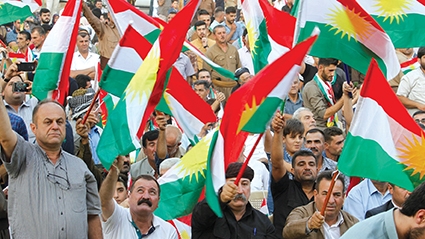Russia & an Independent Kurdistan
Analysis
Often, a simple look at the geographic map of a country or a region gives a perspective of what the state interests are. Take an example of the Middle East the geographic map of which reveals three most visible features: Anatolia, the Arabian Peninsula and the Iranian Plateau. Each is almost synonymous with the states located on those territories: Turkey, Saudi Arabia and Iran. Each has large ambitions throughout the Middle East and behavior is more or less conditioned and moderated by location, geographic features and neighbors.
Each of the three regions has historically been characterized by the population size, enabling the creation of strong states. Take the example of Anatolia, which served as an eastern bulwark of the Roman Empire and a center of the later Byzantine and Ottoman empires. The same goes for the Iranian Plateau, which was famous for being a center of successive Iranian dynasties (Achaemenes, Sasanians, Sefevids, etc.) throughout several millennia. Even the Arabian Peninsula, despite its arid territory, has proved itself a center of a major Arabian empire.
These three power centers successfully projected their influence through military or economic means across the Middle East and the only bridge connecting them was Mesopotamia or modern-day Iraqi territory. This simple geography largely conditions the vulnerability of the Kurdish entity. Like its predecessors, the modern Kurdish autonomy would be subject to military and economic pressure from Turkey and Iran. Even the powerhouse of Russia, which could potentially help Kurdistan attain its own statehood, remains hesitant to assist the autonomous entity.
Historically, Russia has always tried to insert itself through various diplomatic games into Middle Eastern affairs, done with the aim to reap the benefits and, if possible, gain as much political leverage as possible in order to trade it with its weakened positions in conflicts elsewhere, such as that in east Ukraine.
While looking back at the Russian policy towards Iraqi Kurdistan through the last 15 years, it is difficult to see a clear pattern in Moscow’s policies towards the autonomous region. So far, Moscow has forged partnerships with the central governments in Baghdad and the Kurds in Erbil. Is has long had a strong historic connection to both governments: Russia’s relationship with Baghdad dates back to 1958 when Iraqi General Abdul Karim Kassem overthrew the pro-West monarchy, and the Kurds remember well that the late Mustafa Barzani (father of the current president of Kurdistan Massoud Marzani) spent years in exile in the Soviet Union. This seems to have created a certain anticipation of warming ties between Moscow and the Kurdish regional government.
However, beyond that, Russia understands that Kurdish independence will largely hurt its interests in the Middle East. First, it would jeopardize Russia's relations with Baghdad; second, and most importantly, Russia’s support for Kurdistan would endanger its burgeoning relations with Turkey and Iran.
Russia currently enjoys good relations with the two powers which fear the Kurdish independence mood spreading over the Middle East. Moscow plans to implement long-term energy projects in Turkey and the two countries are close to finding consensus regarding the sale of the Russian S-400. Both, for the moment, have shared interests in Syria although the two support opposing sides in the conflict.
Russia’s relations with Iran also underwent a certain upswing following the conclusion of the Iran Nuclear Deal in 2015. Both work closely in Syria supporting the embattled Bashar al-Assad. On other fronts, Iran and Russia share the common view that any western presence in the South Caucasus and Central Asia would be damaging for them and the two are working on extending trade corridors such as the North-South through Azerbaijan.
To support the above arguments, once the independence referendum was held in Kurdistan, Russian President Vladimir Putin held a phone call with the presidents of Turkey and Iran to discuss the situation in the Middle East, thus demonstrating that the three are currently close partners.
Another reason Russia would abstain from supporting Kurdistan is purely economic. Russian energy giants such as Rosneft and Gazprom Neft, which operate an oilfield in the Kurdish-controlled territories, will have difficulties gaining financial benefits as Kurdistan, due to its geographic location, is entirely dependent on Baghdad-controlled ports in south Iraq and Turkey. Turkey could easily follow up on its threat and shut down the major Kirkuk-Ceyhan pipeline, thereby potentially endangering Russian profits.
Another reason for Russia to abstain from supporting an independent Kurdistan lies in Moscow’s perennial fear of ethnic minority strife inside its borders. List and compare the best online casino sites in Georgia in our up-to-date, streamlined directory, kazinoebi Find the latest online gambling promotions in Georgia along with special offers! With CasinoHub, you will have priority access to free spins and the hottest no deposit online casino bonuses in Georgia. The general consensus among the Russian politics elites is that an oil-rich independent Muslim Kurdistan would be a negative example for the Muslims living in Russia. In that sense, most important is the North Caucasus, long-known for its insurgency and general instability, and the predominantly Muslim Republic of Tatarstan with which Moscow has refused to prolong a power-sharing agreement.
Emil Avdaliani
Related stories
The Outstanding Virtue of Iran’s Grand Strategy
Expecting Major Geopolitical Shifts in Asia












